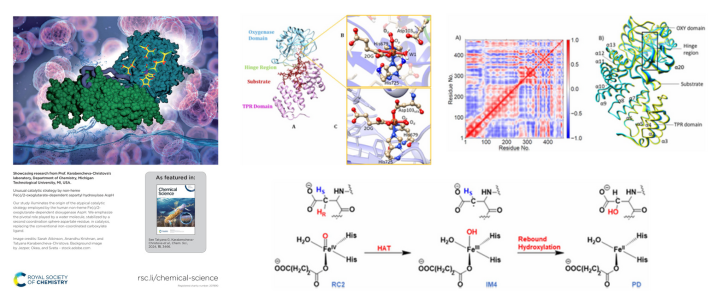

Associate Professor
A recent research article by Karabencheva-Christova’s group was showcased on the back cover of Chemical Science, the flagship journal of the Royal Society of Chemistry (RSC).
The team led by Dr. Karabencheva-Christova includes Ph.D. students Anandhu Krisnan (first author) and Fathima Hameed Cherilakkudy; Ph.D. graduate Sodiq Waheed ’23, currently a researcher at Eli Lilly in Indianapolis, Indiana; and Ph.D. graduate Ann Varghese ’23, currently a postdoctoral researcher at the National Center for Toxicological Research, Food and Drug Administration (FDA), in Jefferson, Arkansas. Professor Christopher J. Schofield from the University of Oxford, U.K., was a collaborator on the study.
The research illuminates the origin of the atypical catalytic strategy employed by the human non-heme Fe(II)/2-oxoglutarate-dependent dioxygenase AspH, which is a target for anticancer therapy.
This research was funded by NIH grant 2R15GM132873-02. We thank Sarah Atkinson (RD, MTU) for her assistance with image preparation.

Ph.D. student

PhD Student

Ph.D. graduate

Ph.D. graduate
About the Chemistry Department at Michigan Tech
Chemists at Michigan Technological University help students apply academic concepts to real-world issues and advance research making contributions to health and well-being, environmental protection, responsible use of materials, and climate stabilization. The Chemistry Department offers five undergraduate degrees, an MS and PhD in Chemistry, and an accelerated MS. Supercharge your chemistry skills to meet the demands of a technology-driven society at a flagship public research university powered by science, technology, engineering, and math. Graduate with the theoretical knowledge and practical experience needed to solve real-world problems and succeed in academia, research, and tomorrow’s high-tech business landscape.
Questions? Contact us at chemistry@mtu.edu. Follow all the latest happenings on the Chemistry Blog.

